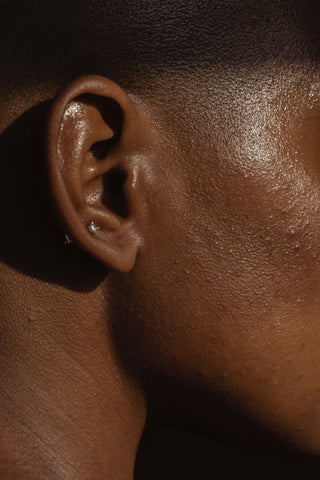Sensitive skin can be a challenge to manage, but it's not an insurmountable issue. Trust us, we've been there.
We understand what it's like when your skin is on red alert. It's why Sarah started to develop natural skincare for her sister, Lauren. Understanding your skin's unique needs is the first step to effectively caring for it. Here's our ultimate guide to understanding and care for stressed, sensitive skin.
What is sensitive skin?
Sensitive skin is characterised by its reactivity to various external factors and can easily become irritated to common skincare ingredients like essential oils and fragrance - none of which are found in our skincare collection. Unlike other skin concerns, it's not typically related to poor skincare practices or reactions to products. Sensitivity often arises from underlying factors within your body and external influences.
What does sensitive skin look like?
Sensitive skin may manifest as redness, dryness, itching, or a burning sensation. It's crucial to treat it with gentle care to prevent aggravating these symptoms and help bring the disrupted skin barrier back into balance.
What can aggravate sensitive skin?
There are numerous factors that can impact sensitive skin and through it off balance. While the time of the month or significant hormonal shifts during life stages like puberty, pregnancy, or menopause are obvious triggers, other factors can exacerbate the situation. These are the primary contributors to skin sensitivity:
-
Stress: stress or prolonged elevated stress levels can lead to an increased production of cortisol, an inflammatory hormone. Over time, this can worsen skin conditions, including acne, eczema, psoriasis, and urticaria. Short-term stress can cause hormone spikes that manifest as skin issues.
-
Sugar: Unfortunately, refined sugar and highly processed foods may contribute to the aggravation of sensitive skin. Excessive consumption of refined sugar can lead to increased oestrogen production, a hormone that directly affects sebum production. In simple terms, excess sugar can result in excess oil production, leading to clogged pores and breakouts.
-
Dairy: Many individuals find that reducing or eliminating dairy from their diet can greatly benefit sensitive skin if you are acne-prone. Dairy products can disrupt hormonal balance, stimulating excessive sebum production, which can lead to clogged pores and congestion. Remember to consult with a doctor or naturopath before making significant dietary changes.
-
Hormones: The use of birth control pills, and discontinuing them, can disrupt your hormone balance. While on the pill, your hormone levels are controlled to prevent pregnancy. However, discontinuing the pill can upset this balance, leading to skin issues. Then comes the perimenopause and menopause where there is a decline in oestrogen levels which impact collagen production, causing drier, thinner and less elastic skin.
What products should I use?
While no topical product can completely resolve sensitive skin issues, establishing a solid skincare routine is essential to maintaining healthy skin. Think of it like your daily strategy to keep your skin in check. Here are some key products and practices to consider:
1. Gentle cleansing: Start with a gentle cleanser like our Balancer Cream Cleanser. It effectively cleanses without stripping the skin or disrupting its delicate oil and pH balance. This formula is a beautiful balance of plant oils and moisture-boosting actives, which is what your skin needs to stay healthy and hydrated.
2. Fragrance-free moisturiser: Opt for a fragrance-free moisturiser like our lightweight, clinically proven Tender Skin Balm to keep skin comforted, soothed and hydrated all day long. It's gentle enough to use every day, from top-to-toe, without causing irritation or disrupting your skin’s natural balance.
3. Hydrating facial oil: Our Hero Facial Oil is made with cold pressed plant oils and soothing Vitamin E, this luxurious lightweight face oil delivers a natural glow, revitalising and nourishing skin to leave it looking and feeling radiant. Perfect for sensitive skin.
4. Night-time care: To help your sensitive skin overnight, reach for our Bakuchiol Booster. Suitable for skin that cannot tolerate topical retinoids, the natural plant oils, Vitamin E and Bakuchiol in this powerful booster help to promote collagen synthesis, deeply hydrate and leave your skin looking radiant. Beauty sleep in a bottle.
Sarah's top tip: Remember that healing and balancing sensitive skin may take time. Pay attention to your diet, lifestyle, and overall well-being. By working with your skin and following these top tips, you should begin to see an improvement in your skin's condition.
For further advice, listen to Sarah's interview with Liz Earle on dealing with stressed and sensitive skin. Or, email us anytime at care@bysarahlondon.com and we'll be happy to help.
--
Join our Newsletter to receive our latest news, arrivals and skincare tips. All content © By Sarah. All rights reserved.




